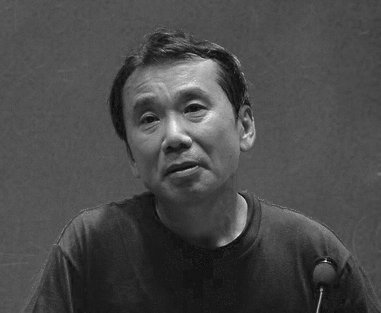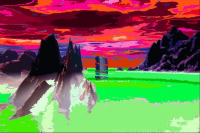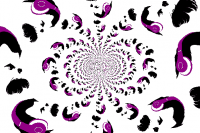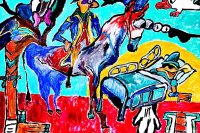“And you really will have to make it through that violent, metaphysical, symbolic storm. No matter how metaphysical or symbolic it might be, make no mistake about it: it will cut through flesh like a thousand razor blades.”
Haruki Murakami, a modern master of magic realism and mind-bending metaphysical mischief (holy alliteration!), has an uncanny and enchanting way of unraveling ideas through the medium of fiction.
 His novel, Kafka on the Shore, is a beautiful example of the surrealistic, infinitely imaginative style and engrossing storytelling that have led to his acclaim.
His novel, Kafka on the Shore, is a beautiful example of the surrealistic, infinitely imaginative style and engrossing storytelling that have led to his acclaim.
In addition to the sheer feast of language (distinct, even in translation) and riveting narrative, Kafka on the Shore contains many a thought-provoking musing à la Murakami’s uniquely eerie, matter-of-fact voice.
On Subjectivity
The idea that each person experiences life in his or her own way is a common and seemingly banal one. And yet, like so many great writers, Murakami has a way of painting anew what may seem a withered concept:
“She leaves behind a damp pillow, wet with her tears. You touch the warmth with your hand and watch the sky outside gradually lighten. Far away a crow caws. The Earth slowly keeps on turning. But beyond any of those details of the real, there are dreams. And everyone’s living in them.”
Perhaps it’s the implicit paradox (we inhabit a “real” world and “dream” world) in these sentences that jolts me into a more poignant awareness of the curious nature of my existence. Murakami gives us several beautiful sensory details–the tear-dampened pillow, the warm hand, the cawing crow, the spinning Earth–only to produce those final two sentences in a sort of chilling, “what is reality?” moment.
The juxtaposition incites a simultaneous awareness of the “real”, shared world and also the inner world–the world of our secrets, our fears, our imaginations, our sense of identity, duty, morality, and worth. Each of us seamlessly inhabits both of these realms all the time, with the two of them interacting in a sort of dynamic interplay.
Our experience of the external world is forever colored by our ideas about what everything (society, work, relationships, success) is, who we are, and how we should act within it. We tend to think of dreams as something imagined and thus “unreal”, yet in a sense we are constantly “dreaming” our own experience, seeing what we believe the world to be, rather than what it is.
On Transformation
Although about many things, Kafka on the Shore is certainly a story of the tribulations and transfigurations of its protagonist, Kafka Tamura. The following passage appears early in the novel and sets the stage for what will become an outrageous journey:
“Sometimes fate is like a small sandstorm that keeps changing directions. You change direction but the sandstorm chases you. You turn again, but the storm adjusts. Over and over you play this out, like some ominous dance with death just before dawn. Why? Because this storm isn’t something that blew in from far away, something that has nothing to do with you. This storm is you. Something inside of you. So all you can do is give in to it, step right inside the storm, closing your eyes and plugging up your ears so the sand doesn’t get in, and walk through it, step by step. There’s no sun there, no moon, no direction, no sense of time. Just fine white sand swirling up into the sky like pulverized bones. That’s the kind of sandstorm you need to imagine.
And you really will have to make it through that violent, metaphysical, symbolic storm. No matter how metaphysical or symbolic it might be, make no mistake about it: it will cut through flesh like a thousand razor blades. People will bleed there, and you will bleed too. Hot, red blood. You’ll catch that blood in your hands, your own blood and the blood of others.
And once the storm is over you won’t remember how you made it through, how you managed to survive. You won’t even be sure, in fact, whether the storm is really over. But one thing is certain. When you come out of the storm you won’t be the same person who walked in. That’s what this storm’s all about.”
In typical fashion, Murakami employs an intriguing simile–a sandstorm–to represent the abstract and sort of strange concept of a fated disturbance within oneself, a kind of unavoidable streak of mental or emotional mayhem.

Murakami lecturing at MIT in 2005. Via Wiki Commons
Contemplations of destiny aside, this passage strikes me as a particularly poetic version of the idea that pain is a necessary precursor to transformation. One is reminded of Nietzsche’s “loneliest desert” metaphor in Thus Spoke Zarathustra.
The passage suggests that, in time, we will be forced to confront whatever darkness is within us, and that regardless of the intangibility of that darkness, it can inflict the pain of “a thousand razor blades”. This may seem a rather desolate viewpoint, but I find it oddly comforting.
My Take on Murakami’s Passage
I, like you I’m sure, have met storms within myself. Enough time passes and suddenly bam! things are transitioning, people are changing, and you’re trying to understand your role in the great mosaic of life.
This, you find out, is difficult. And you run into all kinds of swamps and snags and sinkholes, some external yet many internal, with which you must grapple.
And it can all be hellaciously painful and overwhelming. And then it can happen again and again, periodically. Hell, these difficulties may never stop. Maybe Rilke was right when he wrote, “The purpose of life is to be defeated by greater and greater things.”
But with each defeat, or each storm traversed (pick your metaphor), you do grow stronger and you do change. And it isn’t just you. It’s everyone–7 billion of us experiencing our own burdens and bruises and metamorphoses in this impossible world.
And that’s where I find a warming comfort in Murakami’s words. It is with his cold honesty that I can sincerely empathize and know that even in the grimmest hour, I am not alone.
If you enjoyed this post, you may want to check out the ways to get free updates from Refine The Mind.
P.S. Kafka on the Shore is splendid in its entirety. Highly recommend it.
About Jordan Bates
Jordan Bates is a Lover of God, healer, mentor of leaders, writer, and music maker. The best way to keep up with his work is to join nearly 7,000 people who read his Substack newsletter.





Very good. Added to my intended reading list. Thanks!
Wonderful. You’re welcome!